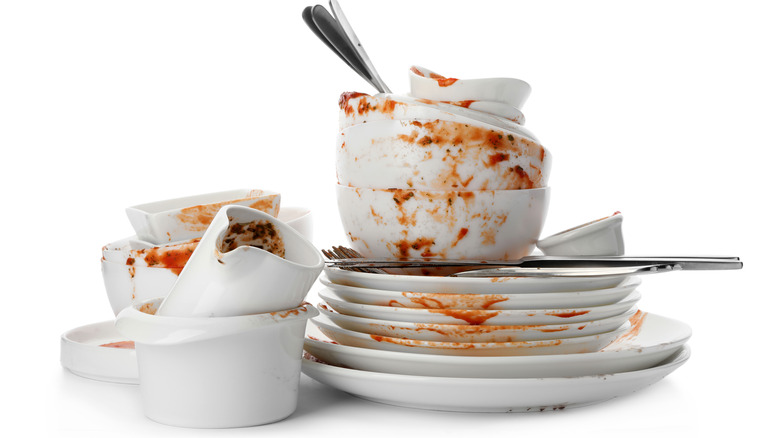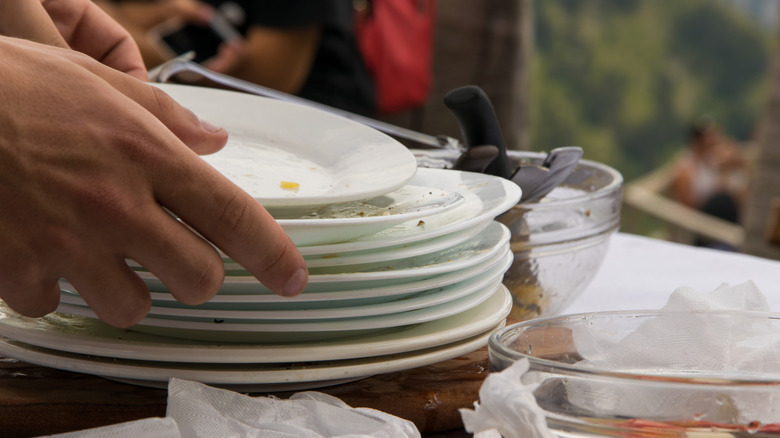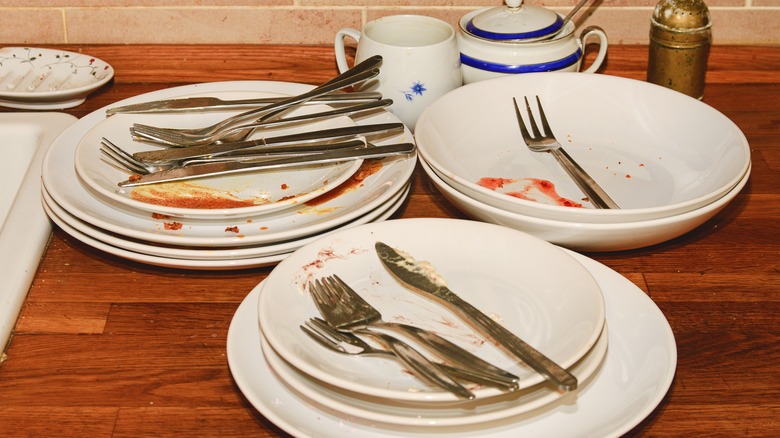Stacking Your Dirty Dishes For Your Server Might Not Be As Helpful As You Think
You might have noticed that since the pandemic the service at your favorite restaurants has been slower, or you haven't been able to get takeout on busy nights. This is because the hospitality industry is struggling to staff most restaurants after mass layoffs when restaurants shut down in the early days of COVID-19. A lot of workers left the industry due to uncertainty and better job stability elsewhere and never came back, according to Eater. At the same time, more people are going out to eat than ever, according to Globe Newswire. This conjures up the perfect storm for restaurant workers having to do the jobs of more than one worker.
If you love to dine out, there are a lot of things you can do to support your favorite local hangouts, like showing up for your reservation on time, being patient if you have to wait for a table or for takeout, and of course, tipping well. There are also, naturally, some ways that you could be making everything worse, like trying to get your server's attention while they're with someone else, seating yourself at a dirty table, and simply being a jerk (per Food & Wine).
Somewhere in the middle, there are some tips floating around the internet and social media about ways to behave in a restaurant to be helpful, which are well-meaning, but actually not true. The biggest one, shockingly, is stacking your plates when you're done eating.
Stacking doesn't help the server
If you're a conscientious person, you probably would like to do everything you can to make your server's life easier, including cleaning up your table when you're finished eating like you would offer to do when having dinner at a friend's house. It may feel like you're doing the overworked staff a favor by stacking up the plates so that a busser can grab and clear everything easier, but this is not the case.
In fact, servers won't tell you, but plate stacking is one of their biggest pet peeves, according to Taste of Home. This is because restaurant workers are trained to clear tables a certain way and to carry multiple plates without dropping them. When you stack your own plates, unless you've worked in restaurants you probably don't know what order to put them in, and when someone comes along to pick them up, chances are something is going to get dropped on the floor.
Another reason to resist stacking is that it actually makes it harder to get everything off the table. William Bonilla, service captain at the Kimpton Hotel Monaco restaurant Dirty Habit, in Washington, D.C., explained to TODAY that you should leave the stacking to the pros. "As much as we appreciate the effort to assist us, it really just makes it harder for us to clear and clean a table," he said.
Let people do their jobs
Stacking your plates at the table is also a bit horrifying for a server to see because it signals that the table has been sitting too long — a sign of bad service, especially in fine dining. The Takeout explains that a stack of plates makes it look like a table has been waiting for someone to come by the table and take things away. If the staff is doing their jobs correctly, there should be someone keeping an eye out from across the dining room to see when everyone puts down their forks and it's time to clear.
Stacks are also messy, and customers often stick trash and napkins between plates and into cups, which creates more work for the staff. When dishes get picked up and go through the double doors into the kitchen, there are also pretty strict sorting systems for going into the dishwasher, and stacks slow the whole process down.
It may feel like you're doing your server a solid, but it's actually better to just wait for the server or busser to come along and clear your plates and empty glassware after you eat. If you're finished, the old-fashioned method of placing your silverware on the plate either straight up and down in the center of the plate or between 10:00 and 4:00 still works great for letting the server know you're finished eating and ready to be cleared (per LinkedIn).


